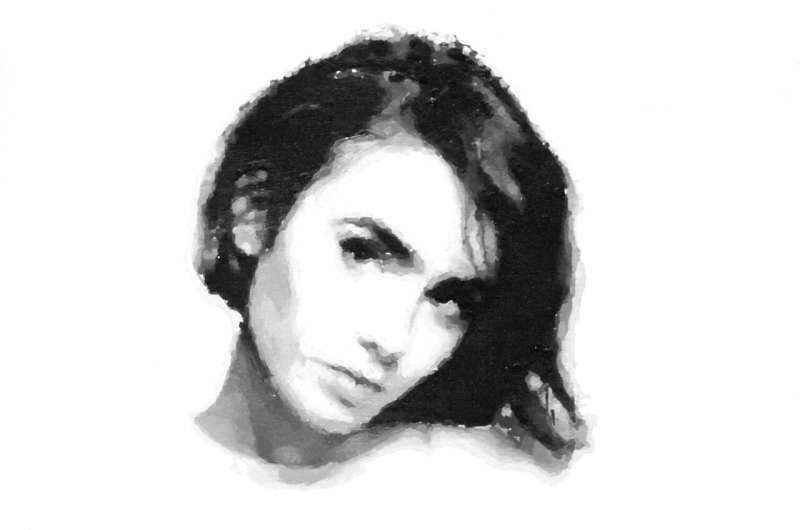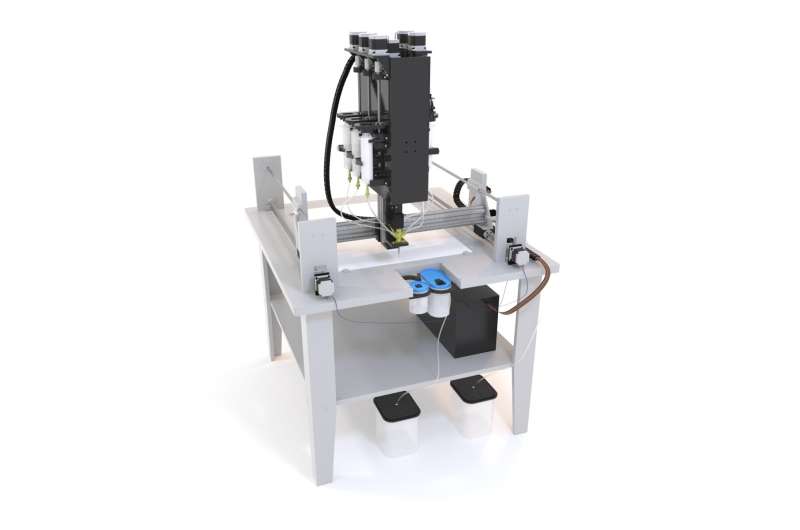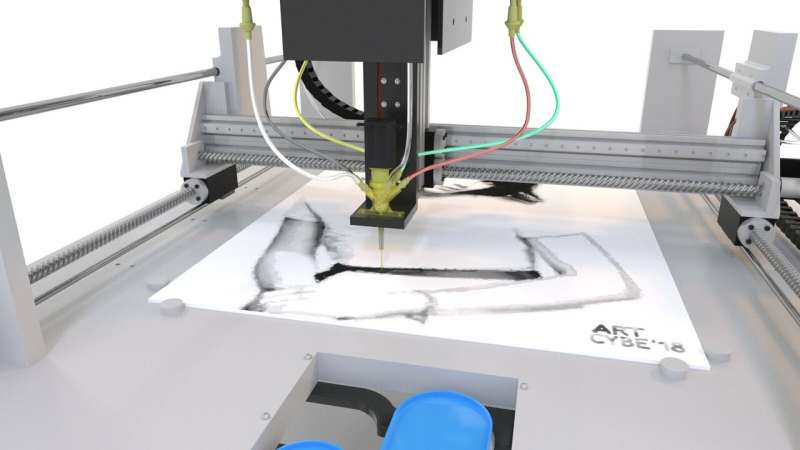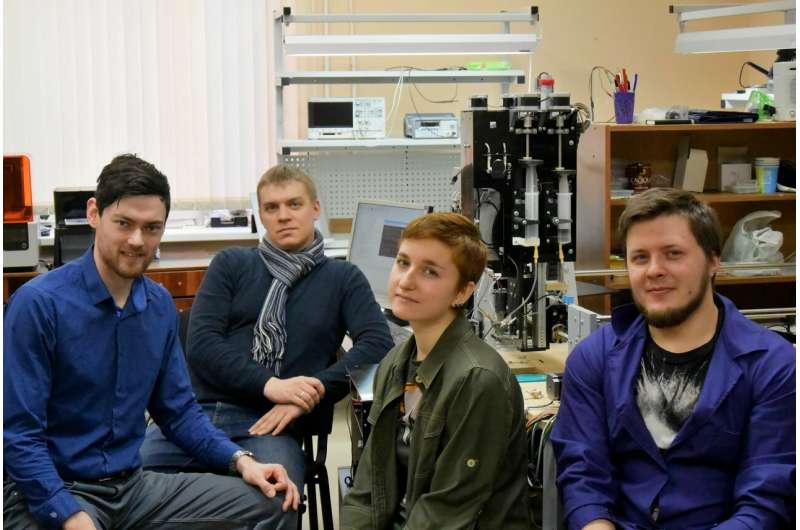March 4, 2019 feature
A new robot for artistic grayscale painting

A team of researchers at St. Petersburg Electrotechnical University (ETU-LETI) and Ural Federal University (URFU) has recently created a new robotic setup for realistic grayscale painting. The project's lead developer, Dr. Artur Karimov, is a professional artist fascinated by the possibility of exploring new frontiers in art using technology.
"When implementing the project-based learning, we at ETU-LETI try to choose the most challenging and relevant research problems," Denis Butusov, one of the researchers who carried out the study, told TechXplore. "Developing a robot able to create artistic objects in a human-like manner is a great challenge for researchers in robotics and artificial intelligence. This idea came from our students, who were inspired by the original and interdisciplinary nature of such a project. Our objective was not only to create hardware and software for the robotic painter, but also to estimate the possible cultural and social impact of painting robots."
Advances in digital technology and robotics have opened up fascinating possibilities for artists, paving the way for new forms of art. Several studies have hence tried to merge technology and art in innovative ways, through the development of interactive and machine-enhanced systems for creative purposes.
To date, researchers have developed numerous advanced painting robots, some of which can produce paintings that resemble those made by human artists. Despite these promising results, high-grade color rendition remains a key challenge in the development of robotic painters. To address this challenge, the researchers at ETU-LETI and URFU equipped their painting robot with a unique paint mixing device that can enhance tone and color rendition. In addition, they developed a new algorithm for painterly rendering designed to further assist their robotic painter.

"Today, as robots and computers transform all areas of our life, visual art also changes," Dr. Karimov said. "We believe that machines could create paintings not worse than humans do if we teach them to imitate fillings and artistic individuality in their works. In the 1950s, Alan Turing conjectured that it is possible to create a machine indistinguishable from a human in conversation. We believe that it is possible to build a painting robot capable of creating paintings that, once exhibited to the public, will be confused with the works of human artists."
The robotic painter devised by Dr. Karimov, Butusov and their colleagues is a 3-DoF CNC machine equipped with a brush, a paint mixing device and a syringe pump block for paint supplement. In their study, the researchers used their robot for monochrome painting with black and white acrylic paints.
"The most interesting and novel part of our painting machine is a block of precise paint pumps that is connected to an original brush," Butusov explained. "All this hardware is installed on a coordinate machine chassis."

Unlike similar painting robots, which are designed to mix primary paints on an artistic palette or directly on the canvas, this new robot mixes paints using a unique tiny mixer connected to a hollow brush. Ultimately, this allows it to paint faster, producing higher-quality paintings. The researchers also developed a painterly rendering algorithm that further enhances the quality of the robot's artworks.
"The main idea of our painterly rendering algorithm is to find gradients of brightness in an image and apply brushstrokes perpendicularly to them," Dr. Karimov said. "In academic painting, this is often referred to as 'applying brushstrokes along a shape.'"
In their study, the researchers used their newly developed robot to create realistic artworks, which are essentially artistic reproductions of source images. They then carried out tests to evaluate the accuracy of tone rendition in their robot's paintings.
"We proved that our approach for on-the-flow paint mixing is fruitful and advanced," Dr. Karimov said. "Today, our machine successfully paints grayscale images with apparent aesthetics automatically, without any human assistance."

In initial tests, the painting machine developed by Dr. Karimov, Butusov and their colleagues rendered a full range of gray tones with a root mean square error 5.7 percent in RGB color space. In the future, their paint mixing device and painterly rendering algorithm could help to improve tone rendition in paintings created by machines.
"The main practical finding of our study is that today, off-shelf mechanics is enough for constructing a robot able to perform the Artistic Turing Test," Butusov said. "However, the most laborious and complex part of robots is still their software. Here we propose a novel painterly rendering algorithm allowing to construct vector maps from rasterized source images."
In their recent study, the researchers were unable to overcome problems related to visual feedback. To effectively tackle these issues, they would need to make adjustments to their robot's software and hardware. According to Butusov, this task will most likely be assigned to a future generation of ETU-LETI researchers.
"First, we will improve our robot to implement color painting," Dr. Karimov said. "We also plan to design a new version of the machine suitable for commercial purposes."
More information: Artur I. Karimov et al. Advanced tone rendition technique for a painting robot, Robotics and Autonomous Systems (2019). DOI: 10.1016/j.robot.2019.02.009
© 2019 Science X Network



















